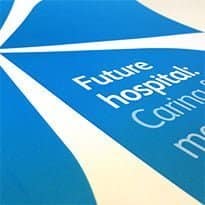RCP launches Future Hospital
- 12 September 2013

The Royal College of Physicians has called for a new approach to IT, built around “structured, standardised records”, to underpin its new blueprint for hospital care.
The RCP launched what its president, Sir Richard Thompson, described as a “radical” report at its headquarters in London’s Regent’s Park yesterday and used a chapter of it to promote the record keeping standards developed by its Health Informatics Unit.
The ‘Future Hospital’ report argues that electronic records based on the standards and supporting SNOMED CT coding will be essential to realise its vision of care rebuilt around more use of generalist physicians to co-ordinate patient care, both in hospital and in the community.
It also argues that patients should be “fully engaged in the design and implementation of electronic health record systems and other digital health tools” so they can contribute to their own care and provide feedback.
The chair of the Future Hospital Commission, Professor Sir Michael Rawlins, told EHI that the RCP would be looking for hospitals to develop the report’s ideas and that this might include piloting the IT elements.
“Different trusts will pilot different aspects of the report and they will develop those in different ways, so we should be able to find out what works and to encourage others to learn from that,” he said.
The RCP set up the commission in March last year in response to pressure on emergency departments and acute general medicine, caused by hospitals seeing more older patients and more complex cases against a backdrop of reducing bed numbers and length of stay.
Sir Richard said the situation had worsened over the past 18 months, with some hospitals predicting they could see 15% more patients in their emergency departments this winter.
As the RCP was holding its report launch press conference, the Department of Health was being forced to announce an emergency cash injection for 53 hospitals to address the return of ‘winter pressures’.
However, Sir Michael stressed there was no point looking to money to solve the bigger problems, because it is clear that the NHS will not receive large, sustained increases of funding in the future.
Instead, he said the report aimed to find better ways of managing the resources that it had to make sure that “patients do not just get the care they demand, but the care they deserve.”
Professor Tim Evans, the academic vice president of the RCP and the lead fellow on the commission, said the report was built around a handful of core principles, starting with local “citizenship charters” to set out what patients should expect.
But the bulk of it deals with “significant process change.”
‘Future Hospital’ says the chief of medicine should lead a medical division that will not just oversee hospital medical services, but be responsible for bringing in specialists and organising primary, community and social services support when necessary.
It calls for hospitals to set up an acute care hub to focus on making sure that acutely ill patients are assessed and stabilised by a senior physician as soon as possible.
And it says hospitals should set up a clinical co-ordination centre to act as the “operational command” for the medical division, holding “detailed, real time information on patients’ care needs and status” in “a single, electronic patient record, developed to common standards” that can be accessed by all who need it.
Other recommendations include a move to seven day working, not moving patients from bed to bed unless their clinical care requires it, and making sure that patients have a named consultant responsible for their care.
The report also calls for the importance of generalists to be recognised, for hospitals to drop the idea of ‘discharging’ patients, and to consultants to extend care into the community if necessary.
Professor Evans acknowledged that this might lead to hospital reorganisations and closures; but the RCP panel refused to be drawn on how many hospitals might be affected and the time scale over which this might happen.
Professor Iain Carpenter, chair of the Professional Record Standards Body, is interviewed about record keeping standards on the CCIO Leaders Network pages this week.
Professor John Williams from the RCP will be presenting on the Future Hospital Commission at the CCIO Leaders Network Annual Conference, which is co-located with EHI Live 2013 at the NEC in Birmingham from 5-6 November. This year, the show is free for all visitors to attend.




